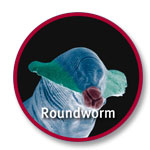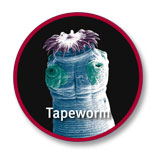Routine Worming
Protects dogs and children
Use our prescription worming tablets every 3 months - treats all known worms.
Pups should be wormed at the age of 2 weeks, 4 weeks, 6 weeks, 8 weeks, 12 weeks and 16 weeks, then every 3 months throughout life.
Worming - What NOT to use
Many old-fashioned wormers still on general sale are ineffective or have side effects. Some cheap tapeworm tablets still use dichlorvos which can cause convulsions and vomiting.
About Roundworms:
 Roundworms produce thousands of tiny eggs which are passed in the faeces and lie dormant on the ground. These eggs are transmitted directly to other dogs and cats as they sniff and lick around. They even re-infect the host dog directly as he licks his own rear end. Roundworms will often be vomited up by pups and kittens but in adult dogs and cats there may be no clues to indicate that roundworms are present. They will still be there draining the body's resources and triggering allergies.
Roundworms produce thousands of tiny eggs which are passed in the faeces and lie dormant on the ground. These eggs are transmitted directly to other dogs and cats as they sniff and lick around. They even re-infect the host dog directly as he licks his own rear end. Roundworms will often be vomited up by pups and kittens but in adult dogs and cats there may be no clues to indicate that roundworms are present. They will still be there draining the body's resources and triggering allergies.
Risk to children. Roundworm eggs can remain active on the ground (grass, beaches, play areas) for a long time. They can then be transmitted via a child's hand to the mouth. Once ingested they develop into larvae that can migrate inside the child's body. If they end up in the eye they can damage eyesight. Regular worming is vital for all dogs, especially those in regular contact with children.
About Tapeworms:
 Some tapeworms are transmitted by fleas. The dog, irritated by the flea, grooms itself and eats the flea. In the bowel the flea is digested releasing the tapeworm to develop in the gut.
Some tapeworms are transmitted by fleas. The dog, irritated by the flea, grooms itself and eats the flea. In the bowel the flea is digested releasing the tapeworm to develop in the gut.
Other tapeworms are transmitted by eating uncooked meat, scavenging or hunting. Adult tapeworms develop in the gut. Tapeworm segments are passed in the dog's faeces and are eaten by birds and mice. The tapeworms form cysts in the muscles of these small animals and remain dormant until the flesh is eaten by a dog or cat. The cysts then develops into tapeworms in the gut. Tapeworm segments like tiny slugs or dried up grains of rice may be seen near the anus, or lengths of tapeworm may be "washed out" by diarrhoea.
Useful link for more information http://www.wormpatrol.co.uk/
.jpg) 30 years ago..... (David Higginson MRCVS remembers)
30 years ago..... (David Higginson MRCVS remembers)
Barely a day would go by without a dog passing worms in the consulting room. Thin wormy puppies, scrawny mongrels and scavenging terriers all produced their worm specimens after rectal examination. It was always easy to add to my collection of bottled worm species! These days such heavy worm infestation do not occur in dogs that are wormed regularly with Milbemax. Unwormed dogs may show no signs of worms but if they become ill for some other reason they will deteriorate more quickly because of the debilitating effects of worms. 30 years ago we'd never heard of dermatitis and bowel inflammation caused by allergies to worms, and the risk of roundworms to children was not understood.

